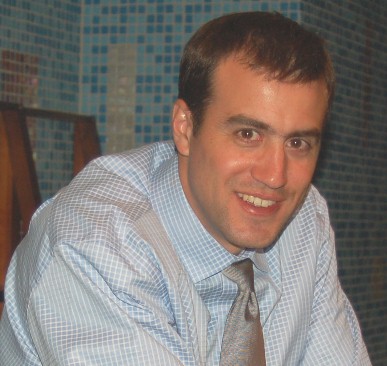
This interview is with Brian Littleton from ShareaSale. Some key points of the interview: Learn how a company is using affiliate marketing to monetize the "long tail" of traffic. Find out how offers can be made to last for years without modification. Discover how ShareaSale is monetizing Facebook viral traffic.
Full Interview Audio and Transcript
Fast Track Interview
Adrian Bye: Brian, tell us about your business and what it is you do?
Brian Littleton: ShareASale is an affiliate marketing network, focused mostly on the retail side of business. This means we put together an affiliate or a publisher with a retail merchant and give the affiliate the opportunity to earn a percentage of sales for those customers that are referred to that merchant.
Adrian Bye: Tell us a little about who you are and how you got started in this kind of business.
Brian Littleton: Sometime in 2000 or late 1999, I was working in a web design firm and some clients were looking for a way to advertise a company without a prepaid budget. Performance marketing was interesting to these clients because they were able to pay when results actually came in. So I decided to start a company to take care of those clients. There were competitors in the space at the time but they were mostly focused on big brands, big companies, and I wanted to take care of the other 95 percent of web retailers who are either small or midsized, or even those kind of in the list of the Internet Retailer Top 500. So, I started the business and suddenly its six years later and here we are. We’ve got a little over 2,000 online retailers on our network right now.
Adrian Bye: Can you talk about company size?
Brian Littleton: The company is fairly small. We have eight people here in Chicago.
Adrian Bye: You have a fairly reasonable presence in your market and its run with eight people?
Brian Littleton: Yes. We have spent a ton of time on the systems that take place behind the scenes. This system takes in merchants or retailers’ data feeds and the products that come in. We automate the whole process, like payments and those kinds of things. So the people in our organization are there to personally assist the clients that we have. Now lucky for us, not all 2,000 will call in on one day, but the organization itself is pretty streamlined so that we’re able to do it without too much human overhead, so to speak.
Adrian Bye: Could you explain your model? I see you as an automated CPA network along the lines of what ClickBank is doing. Would you agree with that?
Brian Littleton: I’ll agree with parts of that. When you think of a typical CPA network, it is something that’s definitely very personalized. It requires someone calling up a publisher and then convincing them that an offer is a good one to run at a specific time. That may be due to the types offers typically run being time sensitive or run on many different networks. So, a CPA network attempts to convince a publisher to be loyal to their network, so to speak, for that one offer or more.
Our offers tend to be more long term. It’s not a retailer doing a two-month campaign. Instead you know it’s going to be there for years. And so, we work with their marketing departments and help them to run their program. We also work with a number of external firms that are hired by those retailers to run their programs. But, I do think part of your statement is correct in the sense, that we kind of create the platform for them to work on. Then they work off it on their own, relying on us for assistance from time to time. So, it’s not like we’re actively running 2,000 different campaigns. That would not be possible with eight people.
Adrian Bye: In my experience working with CPA networks, their issue is always getting more traffic volume. So they’re always out trying to get publishers and on the other side they’ve got hundreds or even thousands of advertisers beating down their doors trying to get into their site. I imagine it’s the same for you. How do you get publishers and how do you decide which advertisers to run?
Brian Littleton: That’s definitely a concern. Plenty of merchants or advertisers are out there trying to market their products. There are more of those than good quality publishers and affiliates, and that probably will always be the case. We do have to go out and research and find the biggest publishers. These are the best professionals running all kinds of different campaigns and we’re sure they know what they’re doing. Merchants are responsible for finding affiliates for their own individual programs. If they know they’re selling shoes, for example, and go out and look at certain sites that are not necessarily professional affiliates; ones that are joined with all the networks, etc. but, ones where they are really interested just for their specific product; they go out and do that and it kind of snowballs on top of itself because of the high volume of merchants that we have. We find if we recruit one affiliate in and he gets interested in the whole concept of what’s going on, he’s more likely to participate in other programs.
Adrian Bye: So you reach out to publishers that you think have volume?
 Brian Littleton: Definitely. We’ve done that over the years and I think our company has received enough recognition that we’re in a position that people know who we are. The professional affiliates out there working with many different networks typically have ShareASale in the mix somehow.
Brian Littleton: Definitely. We’ve done that over the years and I think our company has received enough recognition that we’re in a position that people know who we are. The professional affiliates out there working with many different networks typically have ShareASale in the mix somehow.
Adrian Bye: And so, now, you don’t really spend much time in recruiting publishers now, is that correct?
Brian Littleton: No, we definitely do. We still have to go out and work just as hard as ever. We’re at industry conferences. We hold our own ‘think tank’ is what we call it, which is actually coming up in about four weeks. We invite not only our current best publishers to these events, but also those that we are looking to recruit so that we can talk to them about what we do. We show them who our merchants and try to convince them that for their time we’re worth looking at.
Adrian Bye: What is the percentage that you take and what’s in place to stop the merchant from working around you and just going directly to the affiliates?
Brian Littleton: I would think that’s probably always the concern for any network. We think our product has enough value in it that merchants will stick around and that’s been proven over the years. We don’t have a high volume of situations where a merchant is just trying to take their affiliates and leave the network. The glue is the loyalty that we have between our merchant clients and us, which we feel is strong enough to keep them onboard.
Adrian Bye: So, what is that glue? I mean in the case of a network there isn’t that much so they will not tend to say where the traffic is coming from, that’s confidential. Clickbank handles the billing and merchant processing and then sends the advertiser a check. So how do you do it?
Brian Littleton: Well we definitely handle the billing, which is a sizable task, though I recognize it’s something they could do on their own. All the payments and tax forms for affiliates are going out are going out from ShareASale and not directly from a merchant. Additionally, we’re providing them with kind of a growing technology platform as well. It’s not just the idea of tracking sales, but we are continually developing new tools for them to help their affiliates.
We recently launched the ‘widget tool.’ This is an effective way for a merchant to build a widget, if you’re familiar with that term. It allows their merchant affiliates to then go out and place those widgets on their sites; and it’s kind of a dynamically updated list of recent products or hot deals or whatever it’s assigned to be. This is something a merchant probably wouldn’t have the ability to do on their own or would have to dedicate a lot of time to in order to build themselves. But it’s a tool we’re just providing to them as part of the network.
Adrian Bye: So all they have to do is put some creatives into the system and your system will automatically place that into a widget for the guys to run traffic?
 Brian Littleton: Right. With the widget builder they put in the products and the builder creates the widget automatically. There are other examples of things we utilize as a way to support our merchants to create the glue, so that we’re not just a middleman that’s not doing anything. We try to help them grow their programs in the ways we feel best for a network to do so.
Brian Littleton: Right. With the widget builder they put in the products and the builder creates the widget automatically. There are other examples of things we utilize as a way to support our merchants to create the glue, so that we’re not just a middleman that’s not doing anything. We try to help them grow their programs in the ways we feel best for a network to do so.
Adrian Bye: And obviously you’re incentivized to do that because the more you can help those guys grow then, you’re on a commission basis, so the more your business grows?
Brian Littleton: Yes, definitely. We are paid on a commission basis and we’re not going to just sit back on that. But, we want to provide a valuable service to them as well, to help them increase their business and as we do that it obviously helps our bottom line, too.
Adrian Bye: So, okay, let’s say I’ve been selling an e-book online, it’s doing reasonably well and I want to grow it out but I don’t like handling my own processing and I come to you. What do I have to pay as an advertiser to get started and what kind of percentages do I have to pay to work with you?
Brian Littleton: The setup right now on the network is $350.00 and the transaction fee is 20 percent. And, I’m sure you’re aware, whatever you pay out to the affiliate that’s selling the product, the fee is 20 percent of that number.
Adrian Bye: If anyone pays the $350.00 can they become an advertiser in your network?
Brian Littleton: Yes. I mean we don’t accept offers we consider to be either illegal or anything along those lines. But other than that, they come in, and are allowed to run their program as they wish to run it. This is because we’re not pushing these offers onto affiliates, instead where they are choosing to run them themselves. So other offers, as long as they aren’t so bad that they don’t fit with what we’re doing, are not going to harm the network. This is different than a CPA network, where they are pushing offers to a smaller group of publishers. They really need to make sure that that thing works every time because otherwise that publisher would go somewhere else.
Adrian Bye: Are you the main source of traffic or are you just one of many?
Brian Littleton: Most typically for larger merchants we’re one of two affiliate sources since most don’t participate in more than two. We like to see just one because it runs smoother that way. But there are usually no more than two affiliate channels, but some have their own internal PPC, they have internal search, and they may have social networking or other channels out there. As for smaller merchants, sometimes we’re the only main traffic source they have and work with.
Adrian Bye: What advertisers or what offers work best on your network; whose getting like the best conversion rates and best numbers?
Brian Littleton: We have our "Power Rank" which is a list of the top 100 by the ShareASale power rank. This is a combination of conversion rate, volume, and commission payout. But, the best thing for us really is any type of retail offer. For the most part ShareASale is a retail-based network. Some are selling furniture, or selling shoes, or selling pet products, etc. We don’t tend to do as well on those kinds of short-time CPA offers that do much better on a CPA network.
Adrian Bye: I noticed in your program, if I’m a publisher, I can put in your code on my site and automatically rotate banners. And, I understand an advertiser can continually put in new creatives that will automatically update those on my site. I don’t have to do anything to change the creatives, is that correct?
 Brian Littleton: Yes and no. It depends on what offer and what creatives the publisher is using. Some creatives, like widgets, are referred to as dynamic creatives. Additionally, merchants also have banners, animated gifs they might put on their site that change because the merchant changes them. They’re all hosted from the ShareASale site so automatically they would change on the affiliate site. But sometimes there are banners that are more static. These are specific to a specific offer from a merchant and that an affiliate will need to manually change out. We don’t do rotational banners through the run of a network or the run of a category. That would be something I would consider more of an ad network type of task. The affiliate network is more focused on the specific relationship between an affiliate and a merchant and they may have banners that rotate through the relationship with some, but not with others.
Brian Littleton: Yes and no. It depends on what offer and what creatives the publisher is using. Some creatives, like widgets, are referred to as dynamic creatives. Additionally, merchants also have banners, animated gifs they might put on their site that change because the merchant changes them. They’re all hosted from the ShareASale site so automatically they would change on the affiliate site. But sometimes there are banners that are more static. These are specific to a specific offer from a merchant and that an affiliate will need to manually change out. We don’t do rotational banners through the run of a network or the run of a category. That would be something I would consider more of an ad network type of task. The affiliate network is more focused on the specific relationship between an affiliate and a merchant and they may have banners that rotate through the relationship with some, but not with others.
Adrian Bye: Do you work with your advertisers to encourage them to do optimization?
Brian Littleton: Definitely. Especially with those who are most willing to work with us and learn and let our experience work for them. We’ve got some good years of experience behind us in what works and what might not work. So, those calling in and asking us for assistance are definitely getting a lot of help on that.
Adrian Bye: What are some interesting things going on in your industry in general? What do you care about? What are some of the problems? What are sort of some interesting things you can tell us that are happening?
Brian Littleton: There are lots of interesting things going on in our industry. It’s always going to be growing because of its nature, and technology. There are probably two most important developments; one positive and one negative. The positive is the introduction of large-scale social media networks and we are learning to take advantage of them from the affiliate marketing model. For example, at Facebook, there are affiliates now using this whole new source of traffic. Granted now it’s from basically a college demographic, but it’s growing into the business side. So affiliates and merchants are both trying to figure out a whole new way to gain customers. A lot of it is being done through affiliate marketing partnerships, because affiliates can be very innovative and more creative than the merchants sometimes are on their own.
And the second part is a negative problem we’re facing, and that is trying to make sure the affiliate channel is not creeping into the work that merchants are doing in their other channels. Pay-per-click bidding is a big issue right now. Pay-per-click bidding on merchant trademarks is an even bigger issue. Affiliates may go out there and have purchased key words that their merchants don’t want them to purchase, for example, the name of a trademark or the name of the company. This is something merchants and networks are facing and trying to make sure interfering with their own customer retention efforts or their own PPC efforts.
Adrian Bye: Very good. Well, thank you very much for taking time for the interview.
Brian Littleton: My pleasure.










